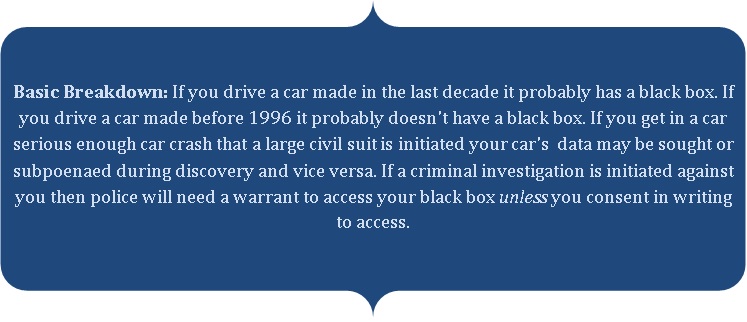Summary of NJ Bill Outlining Access to Data Devices (‘Black Boxes’) of Cars
Submitted by New Jersey Vehicle Accident Lawyer, Jeffrey Hark
Most people have heard of a ‘black box’ associated with major airlines when they crash. Rescue teams tirelessly search for the black box in order to find details such as the flight path, altitude, and time of impact. The same concept has been applied to vehicles since 1996 according to an article that appeared in Forbes. And there is currently new federal legislation to make black boxes a requirement in all models of cars after 2015. So far the issue of black boxes has been left to the states to decide individually and N.J. did just that on December 18th, 2014.
As reported in local news, the lower house of the N.J. Legislature passed bill A3579 which outlines when data from internal vehicle data recording devices can be retrieved and used and by whom. Most newer vehicles contain recording devices that track speed, direction, location and even seat belt use in some cases. The data is usually overwritten by the device itself and is not stored for very long unless a car accident is detected. Supporters of the bill and its federal counterpart want to restrict the availability of data to non-owners of the vehicle. However as seen in the text of the bill there is still ample opportunity for third parties to gain access to the data.
Below is an abridged version of the bill made for this blog but to get a truly accurate representation the complete version must be examined and is attached to this blog.
For the purpose of understanding the bill see the below abridged definitions:
“Owner” in this act refers to a person entitled to possession through a lease or the person with the legal title of the vehicle (regardless of if they have lent or rented the vehicle to another).
“Recorded data” means the data stored or preserved electronically in a recording device that contains performance and operation information about the vehicle (e.g. speed and direction).
“Recording device” does not include personal recording devices like video cameras, dashboard cameras, or cell phones but only one internal to the vehicle.
Main text:
No person except the owner of the motor vehicle that contains the recording device, or the owner’s representative, may retrieve, obtain, or use data recorded, stored, or transmitted from the recording device, unless:
- Owner of vehicle or the owner’s representative consents in writing to the duration and scope of data retrieval and retention prior to or at the time data is retrieved.
- The data is retrieved by a law enforcement office pursuant to a search warrant.
- The recorded data is used for the purpose of improving vehicle safety or for research (the identity of the owner will be hidden).
- The data is retrieved by a licensed new dealer or by a mechanic.
- The data is accessed by an emergency response worker and used for the SOLE purpose of determining the need for medical attention.
- The recorded data is retrieved pursuant to a legally proper discovery request in a civil action.
*no person shall knowingly alter or delete data on the “recording device.” If the device itself has an overwriting feature at certain intervals this does not count as alteration
It is yet to be seen how this will affect civil litigation with respect to car accidents and whether black boxes data will be used to settle even minor fender benders. It seems for the time being that black box data will normally be accessed after particularly serious crashed where damages are greater. It will be interesting to see how courts deal with different types of black boxes that have different capacities for storing information, store data for longer or shorter periods of time, or in accidents where one car has a black box and the other does not. Whether standardization of black boxes will be required for the auto industry is also yet to be seen.

